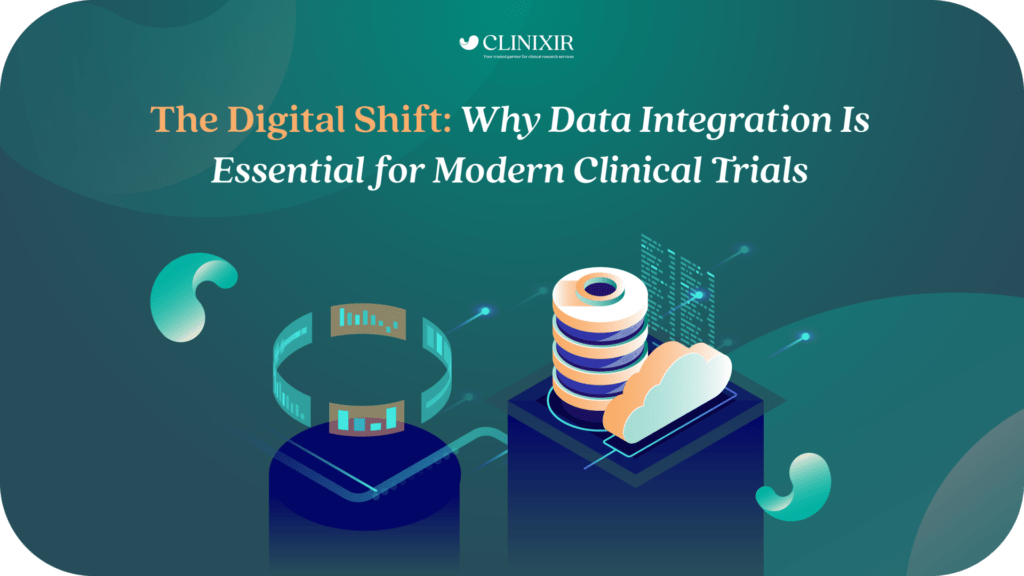The clinical trials landscape is undergoing a seismic shift, driven by technological advancements and the increasing complexity of healthcare research. As trials grow more intricate, the need for seamless data integration becomes paramount. In an era where fragmented data sources and stringent regulatory requirements pose significant challenges, integrating diverse datasets has emerged as a cornerstone for success. This blog explores why data integration is essential for modern clinical trials, the hurdles it helps overcome, and its transformative impact on the industry.
The Growing Complexity of Clinical Trials
Modern clinical trials are more complex than ever before. Factors contributing to this complexity include:
- Diverse Data Sources: Trials now incorporate data from electronic health records (EHRs), wearable devices, genomic sequencing, patient-reported outcomes, and more.
- Globalization: Increasingly, clinical trials span multiple countries, requiring integration of data across different regions, languages, and regulatory frameworks.
- Personalized Medicine: Tailoring treatments to individual patients demands more granular data collection and analysis.
- Regulatory Requirements: Compliance with stringent guidelines, such as those set by the FDA, EMA, and other agencies, requires meticulous data documentation and reporting.
These factors make the traditional siloed approach to data management obsolete. Without integration, managing the sheer volume and variety of data can lead to inefficiencies, errors, and delays in trial completion.
Challenges Solved by Data Integration
Data integration addresses several key challenges that have historically plagued clinical trials. Here’s a closer look at how integration solves these issues:
- Fragmented Data Sources
- The Problem: Data in clinical trials often comes from disparate sources, including hospitals, labs, wearable devices, and patient surveys. These sources typically operate in isolation, creating silos that hinder collaboration and analysis.
- The Solution: Integration platforms unify data from diverse sources into a single, centralized repository. This approach eliminates duplication, ensures consistency, and provides researchers with a comprehensive view of trial data.
- Regulatory Compliance
- The Problem: Meeting regulatory requirements involves meticulous data tracking, auditing, and reporting. Disparate systems increase the risk of errors and non-compliance, leading to costly delays or rejections.
- The Solution: Integrated systems automate compliance processes by tracking data lineage, maintaining audit trails, and ensuring adherence to standards such as GDPR, HIPAA, and 21 CFR Part 11. This reduces the burden on researchers and enhances data integrity.
- Data Quality and Accuracy
- The Problem: Inconsistent data formats and manual processes increase the likelihood of errors, compromising the validity of trial results.
- The Solution: Data integration ensures standardized formats, real-time validation, and automated error-checking, enhancing the reliability and accuracy of trial data.
- Operational Inefficiencies
- The Problem: Fragmented data workflows lead to redundant tasks, miscommunication, and delays in decision-making.
- The Solution: Integrated platforms streamline workflows by providing real-time access to data, enabling faster and more informed decision-making.
Key Benefits of Data Integration in Clinical Trials
The integration of data brings a host of benefits that transform the way clinical trials are conducted. These include:
- Enhanced Collaboration
- With centralized data, stakeholders across different departments, organizations, and regions can collaborate more effectively. Integration ensures everyone works with the same accurate, up-to-date information.
- Accelerated Timelines
- By automating data collection, validation, and reporting, integration significantly reduces the time required to complete trials. Faster trials mean quicker access to life-saving treatments for patients.
- Cost Savings
- Eliminating redundant processes and reducing errors leads to substantial cost savings. Additionally, faster trials reduce overall development expenses.
- Improved Patient Outcomes
- Integrated data enables personalized medicine by providing insights into individual patient responses. This leads to more effective treatments and better outcomes.
- Regulatory Readiness
- With automated compliance features, integrated systems ensure that trials meet regulatory requirements, reducing the risk of costly penalties and rejections.
Technologies Driving Data Integration
Several technologies play a pivotal role in enabling data integration for clinical trials:
- Cloud-Based Platforms
- Cloud technology provides scalable, secure storage and processing for large volumes of data. It enables real-time access for global teams and supports advanced analytics.
- Artificial Intelligence (AI) and Machine Learning (ML)
- AI and ML automate data cleaning, validation, and analysis, uncovering patterns and insights that might otherwise go unnoticed.
- Blockchain
- Blockchain technology enhances data security and transparency by creating immutable records. It is particularly useful for maintaining audit trails and ensuring data integrity.
- Application Programming Interfaces (APIs)
- APIs facilitate seamless communication between different systems, enabling the integration of data from diverse sources.
- Interoperability Standards
- Standards like HL7 and FHIR ensure that data from different systems can be exchanged and understood, promoting interoperability.
Future Trends in Data Integration
The field of data integration is continuously evolving, with several trends shaping its future:
- Decentralized Clinical Trials (DCTs):
- DCTs rely heavily on integrated data from remote monitoring devices, telemedicine platforms, and patient-reported outcomes. Integration ensures these diverse datasets work together seamlessly.
- Real-World Evidence (RWE):
- By integrating data from real-world sources such as EHRs and claims databases, researchers can complement trial data with insights from everyday clinical practice.
- AI-Driven Insights:
- Advanced AI algorithms will further enhance integration by automating data harmonization and generating actionable insights.
- Patient-Centric Approaches:
- Integration technologies will increasingly prioritize patient engagement, enabling personalized experiences and empowering patients to contribute to their own healthcare journey.
As clinical trials grow more complex, data integration has become an essential enabler of success. By addressing challenges such as fragmented data sources, regulatory compliance, and operational inefficiencies, integration transforms the way trials are conducted. The benefits are profound: faster timelines, cost savings, improved collaboration, and better patient outcomes.
At Clinixir, we recognize the transformative potential of data integration. By leveraging advanced technologies and innovative approaches, we are committed to redefining clinical trials for the modern era. As the industry continues to evolve, data integration will remain at the heart of this digital shift, driving progress and delivering life-changing therapies to patients worldwide.
Are you ready to embrace the future of clinical trials? Connect with us at Clinixir, and together, let’s harness the power of integration to revolutionize healthcare.



